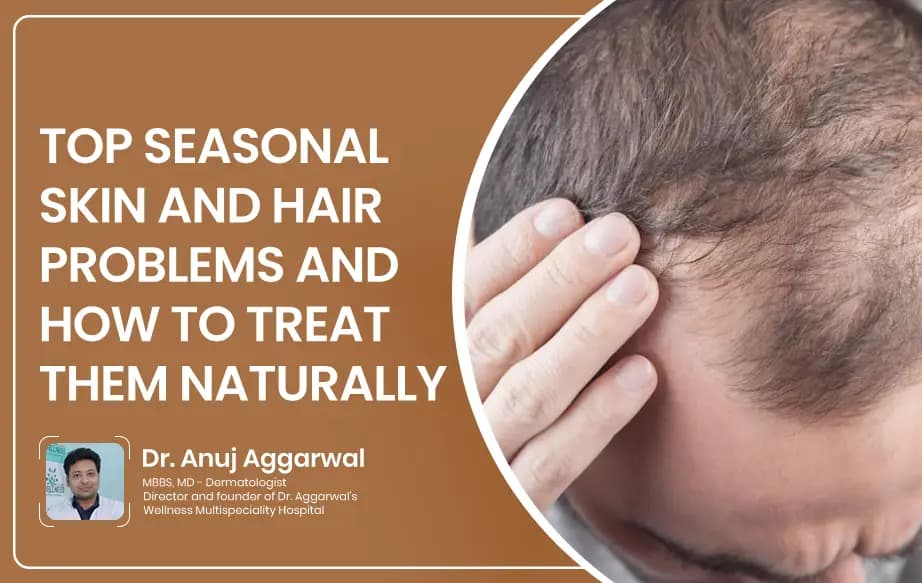
Top Seasonal Skin and Hair Problems and How to Treat Them Naturally
Each season brings its beauty, but also a unique set of challenges for your skin and hair. From summer sweat to winter dryness, environmental changes affect the body’s largest organ, your skin, and your scalp and hair health. Knowing how to adapt your skincare and haircare routine to each season can help you avoid common issues and maintain natural balance.
In this blog, we’ll explore the most common seasonal skin and hair problems, why they happen, and how to manage them using simple, natural remedies that are accessible and safe.
Summer Problems: Oily Skin, Breakouts & Frizzy Hair
Why It Happens:
-
Higher temperatures and humidity increase sweat and oil production.
-
UV exposure leads to sunburn, pigmentation, and premature aging.
-
Excessive sweating clogs pores, leading to acne and blackheads.
-
Hair becomes frizzy, dry, or limp due to the sun and sweat.
Natural Treatments:
-
Aloe Vera Gel: Has anti-inflammatory and soothing properties; ideal for calming sunburnt or irritated skin.
-
Cucumber Juice or Rose Water: Natural toners that tighten pores and cool the skin.
-
Fuller’s Earth (Multani Mitti) Mask: Absorbs excess oil and reduces acne flare-ups.
-
Coconut Oil (for Hair): Seals moisture into hair shafts and protects from sun exposure.
-
Neem Water Scalp Rinse: Acts as an antibacterial and antifungal to prevent scalp infections.
Winter Problems: Dry Skin, Flakiness & Dandruff
Why It Happens:
-
Cold, dry air and indoor heating strip the skin and hair of natural oils.
-
Low humidity reduces moisture in the skin, leading to dry patches, cracks, and irritation.
-
Hair becomes brittle, and the scalp is prone to itchiness and dandruff.
Natural Treatments:
-
Coconut or Almond Oil: Deeply moisturizes the skin and hair. Apply before bathing and rinse with lukewarm water.
-
Honey and Milk Mask: Natural humectants that soften and hydrate dry skin.
-
Shea Butter or Ghee (for Lips): Effective in healing cracked lips and adding long-lasting moisture.
-
Fenugreek (Methi) Hair Pack: Soak seeds overnight, grind into a paste, and apply to the scalp to reduce dandruff.
-
Aloe Vera with Tea Tree Oil: A gentle combination to soothe an itchy scalp and add hydration.
Read more: Breaking Down Hair Myths: What Science Says
Monsoon Problems: Fungal Infections & Hair Fall
Why It Happens:
-
High humidity levels promote fungal and bacterial growth, especially in moist areas of the body.
-
Sweat doesn’t evaporate easily, leading to rashes and itching.
-
Hair absorbs moisture from the air, making it weak, sticky, or frizzy.
-
Rainwater and sweat can make the scalp a breeding ground for infections.
Natural Treatments:
-
Neem and Turmeric Paste: Both have strong antimicrobial properties that help fight skin infections.
-
Tea Tree Oil (Diluted): Useful for treating acne or scalp conditions caused by fungus.
-
Rice Flour Scrub: Gentle exfoliant for removing sweat, dirt, and dead skin cells.
-
Amla + Tulsi Hair Mask: Strengthens roots and reduces seasonal hair fall.
-
Apple Cider Vinegar (ACV) Rinse: Restores scalp pH and adds shine while reducing oiliness.
Spring & Autumn Problems: Allergies and Hair Shedding
Why It Happens:
-
As seasons transition, the skin may become sensitive to pollen or allergens in the environment.
-
Dry winds in autumn or spring can strip natural oils from the scalp and skin.
-
Seasonal hair shedding occurs due to changes in temperature, daylight, and hormonal shifts.
Natural Treatments:
-
Chamomile or Green Tea Compress: Reduces inflammation and soothes irritated skin.
-
Cold Aloe Vera Gel: Calms allergic reactions and itchiness on the skin.
-
Onion Juice (for Scalp): Known for boosting blood circulation and improving hair regrowth.
-
Biotin-Rich Foods: Include nuts, seeds, spinach, eggs, and bananas to strengthen hair from within.
-
Gentle Oiling with Argan or Jojoba Oil: Lightweight and non-greasy oils that nourish without clogging pores.
Universal Skin and Hair Care Tips for Every Season
Regardless of the weather, certain practices help maintain good skin and hair health year-round. Here are simple, natural habits that apply across seasons:
Skin:
-
Hydration is Key: Drink plenty of water to keep skin cells healthy.
-
Use Natural Sunscreen: Ingredients like aloe vera, raspberry seed oil, and carrot seed oil offer mild sun protection.
-
Avoid Harsh Soaps: Use mild, fragrance-free cleansers made with natural oils or plant extracts.
-
Moisturize Daily: Even oily skin needs hydration—look for natural, non-comedogenic oils like jojoba or rosehip.
Hair:
-
Oil Massage Weekly: Use natural oils to strengthen roots and nourish the scalp.
-
Avoid Hot Showers: Use lukewarm water to prevent stripping natural oils from the scalp.
-
Limit Chemical Styling: Reduce use of heat tools, dyes, and chemical treatments during extreme weather.
-
Cover Hair Outdoors: Protect from sun, wind, and pollution with scarves or hats.
Read more: What Is the Recovery Time After Hair Transplant?
When to Seek Medical Advice
While natural remedies are effective for mild to moderate issues, some conditions may require clinical attention, especially if:
-
Skin infections do not improve with home care
-
Dandruff worsens and causes scalp wounds
-
Persistent hair loss affects your confidence
-
Allergic reactions become severe or recurrent
In such cases, it’s best to consult a licensed dermatologist or trichologist for targeted treatment.
Conclusion
Each season comes with its own effects on the skin and hair, but with the right knowledge and a few natural, time-tested remedies, you can manage these changes smoothly. Listening to your body and adjusting your routine as the weather changes is essential for maintaining long-term skin and hair health.
Content Created By:

CyberBizz Technologies
Team, Content Curator
